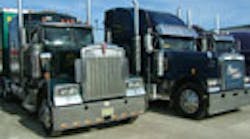In some ways, the biggest challenge facing smaller motor carriers may not be depressed freight rates, the specter of higher diesel prices, or even rising equipment costs due to emission reduction mandates. In the view of Richard Clepper, founder and president of Clepper Consulting Group LLC, the Achilles heel of smaller carriers might be how they sell themselves to their customer base.
“Most of the folks that founded and run smaller trucking companies came from the operating side, they know brakes, fuel economy, engines, and all the technical aspects of trucking as well as anyone,” Clepper told FleetOwner.
“What most don’t know well is the sales and marketing piece of the business, the revenue-generating side of the process,” he said. “Because revenue is the very first line on your P&L [profit and loss] statement, and without revenue, there is no chance for profit.”
Clepper – a 35-year veteran of the motor carrier industry who retired from Yellow Transportation in 2006 – believes small carriers especially must stop viewing sales as a “dirty word” and more actively court both current customers and prospects in order to differentiate themselves from the competition.
“You must avoid the ‘C’ word, ‘commodity,’ at all costs,” he stressed. “If all you are doing is providing space in a 53-foot trailer to your customers, you’ll only get the cheap freight that falls down the food chain. This is where your sales effort comes in, helping you identify customers and prospects in the markets you serve with your trucks, explaining to them the value you provide to their business.”
Getting in front on the customer on a regular basis, said Clepper, helps smaller carriers find out how they are performing and – more importantly – if there are other areas of the customer’s business they can serve.
“If you are asking the right questions, if you are explaining the value of what you do for the customer, there could be whole other markets within that customer’s operation you can serve that you didn’t even know existed, markets you don’t need to expand your operational footprint to serve effectively,” he said.
“Simply put, you can’t wait for the customer to call on you. You must call on the customer to see what else you can do,” Clepper said. “If you don’t have sales people deeply involved in the hierarchy of the customer, then your business with them is at risk.”



